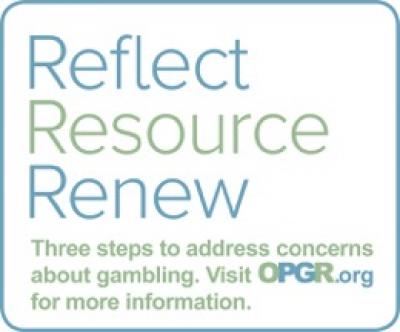Problem Gambling Prevention
The purpose of the problem gambling prevention program is to increase public awareness and educate community members about the issue. Prevention efforts include:
- Building skills in youth that will increase healthy lifestyles and decision-making
- Parent education and awareness of problem behavior
- Community awareness campaigns
- Education regarding problem gambling treatment resources
Guidelines for Responsible Gambling
In Oregon, most adults (87%) agree that if people choose to gamble, they should have their own guidelines for gambling responsibly.
Reflect on these questions, which can prevent problem gambling:
Is gambling only for entertainment?
Most adults (8 out of 10) agree that if people choose to gamble, they should do it for entertainment.
How much is gambling costing you?
Most adults (9 out of 10) agree that people should understand how much gambling costs them. See Play Responsibly
Are losses the cost of entertainment?
Most adults (8 out of 10) agree that people should treat the money they lost as the cost of entertainment.
Is a dollar limit set and followed?
Most adults (9 out of 10) agree that people should set a dollar limit on how much they will gamble and stick to it.
Are losses expected more than winnings?
Most adults (8 out of 10) agree that people should expect to lose when they gamble.
Is trying to win back lost money avoided?
Most adults (9 out of 10) agree that people should avoid "chasing" lost money, that is, they should avoid trying to win back lost money.
Is borrowed money or credit being used for gambling?
Most adults (9 out of 10) agree that people should NOT gamble using borrowed money or credit.
Is a time limit set and followed?
Most adults (8 out of 10) agree that people should set a limit as to how long they will gamble and stick to it.
Is gambling interfering with friends, family, work or other worthwhile activities?
Most adults (9 out of 10) agree that gambling should not interfere with or be a substitute for friends, family, work or other worthwhile activities.
Is gambling used to cope with emotional or physical pain?
Most adults (9 out of 10) agree that people should not gamble to cope with emotional or physical pain.
Is drinking while gambling avoided?
Most adults (6 out of 10) agree that people should not drink alcohol and gamble at the same time.
Is gambling under the age of 21 avoided?
Most adults (8 out of 10) agree that people under the age of 21 should not gamble.
For more information on problem gambling prevention, visit OPRG.org
For more information on the Linn County problem gambling prevention program, please e-mail prevention@co.linn.or.us or call 541-967-3819.

